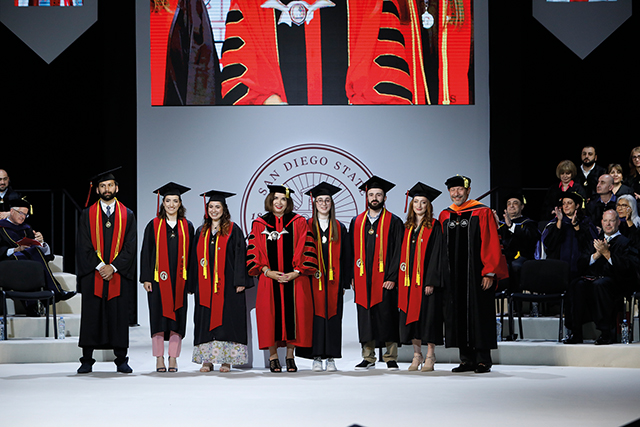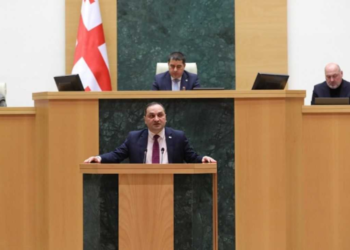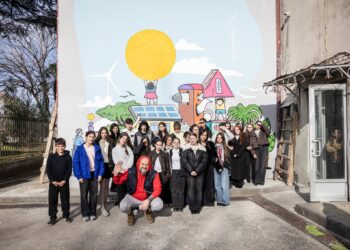San Diego State University (SDSU), through funding from the US Government’s Millennium Challenge Corporation and the Georgian Government, offers internationally accredited Bachelor of Science programs in the fields of Science, Technology, Engineering, and Mathematics (STEM) in Georgia. It does so through its work with and training of faculty at Ilia State University, Tbilisi State University, and the Georgian Technical University.
GEORGIA TODAY met up with Dr. Adela de la Torre, SDSU’s President, one year on from our last interview, and one year ahead of the end of MCC funding, to check in on progress and to find out more about the results of SDSU’s valuable work here.
SDSU has been operating in Georgia since 2015 and you already have more than 400 graduates. How would you assess your results so far? Do you think SDSU has achieved its main mission in Georgia?
We’ve achieved our goals on three important fronts. We’ve enrolled up to 800 students in the programs, 160 graduating this year, and more than 100 due to graduate next year. What’s really great about it is that we’ve developed a workforce that is critical for the Georgian economy, and over 70% of those individuals are staying in Georgia. Those who choose not to are going on to advanced degrees throughout Europe and the United States and are set to come back even better prepared. Many will probably choose to work in the academic environment, which will help stimulate the economy.
We prepare students for all the areas of construction, manufacturing, civil engineering, electrical engineering, areas of energy, that’s very important, computer science and engineering, technology, chemistry and biochemistry for the large pharmaceutical industry. Cyber security too, and digital data sciences. All are skills that the Georgian economy needs in order to grow.
Another critical area is our forging, over several years, of a long-term relationship with the faculty. This was a unique program. It paired our faculty, the SDSU STEM faculty in the College of Sciences and College of Engineering, with faculty in three institutions here: Tbilisi State, Ilia State and Georgian Technical universities. This resulted in cross-training to the point that now, in the Georgian universities, they have accredited programs similar to those in the US, and they are now also able to develop joint research projects and work with joint graduates. That’s going to really solidify the relationship institutionally.
A very important area where we’ve been incredibly influential is creating the kind of civic engagement that enhances democracy. We’ve created a sense of belonging for the Georgian students. And that’s led to improvement in curricular components of general education, which is a cross-curricular component that allows for a broad understanding of liberal arts issues and critical thinking, and broad engagement, but also student government co-curricular activities, where the students are largely engaged in self-government and understand the importance of self-governance.
So in those areas, I would say we’ve done extremely well.

Tell us about the alumni – what did they achieve and where are they now?
The alumni are already working in various industries, so those in chemistry are in the pharmaceutical industry, those in engineering are involved in energy, particularly those in electrical engineering. A number of our computer scientists/engineers are working in data science as well as in programming and software development. And those in construction engineering are involved in both national and international industries. We have SDSU Georgia graduates working at Facebook, Google, Richard Lugar Center, British Petroleum, Klarna, EnergoPro Georgia, and many others in Georgia and around the world.
Our alumni are all very much engaged in important sectors, both in terms of going right into the job market here in Georgia, those going into doctoral and master’s programs, and those focusing on leadership opportunities down the line.
These are some of the top students in Georgia.
Based on the Class of 2021 survey results, 71% of alumni said they are currently working in Georgia and 25% are currently studying in graduate programs
What amazes me is that they are very much engaged in the SDSU Community, being part of the culture of SDSU Alumni, the “Aztecs.” We have half a million alumni in the world. We’re in the top 20 in the US in terms of alumni. The Georgian alumni are part of this large social network. This culture is about giving back. And they’re very much involved in enhancing awareness of STEM education, globally and in Georgia.
45% of current graduates are female. How did SDSU manage to attract such a high number of female students in professions that are somehow regarded as male-dominated?
In 2019, there was a club started by our students called “Empower Women.” The idea was to break the stereotypes of women, particularly in STEM fields, here in Georgia, where in the past it was often perceived that women’s role was not in chemistry or engineering, or computer or construction engineering. They work not only to break down that myth, but also to support each other, because they still have to address the issue of gender discrimination. They’ve been very fortunate that they were able to come together early on to create that synergy and success. SDSU has supported them through our own staffing model. SDSU has a strong history of co-curricular support, with curricular support, and is the basis for achieving student success. These students that graduate after four years, graduate not just into the curricular area of skills, but into the co-curricular too, which requires the development of emotional intelligence, social skills, and creating a sense of social responsibility. This is part of the culture and direction we like to see our students going in.
This year’s class is about 45% women, ranging from 30-60% depending on the field, with computer engineering at 30%. Chemistry-Biochemistry seems to be the more popular among women, but they are very much present in engineering, and that is quite unusual.
I think this is because we were very effective in the outreach in the K to 12, in the high schools here. We were able to reach out to all individuals, regardless of gender or identity structure. And a lot of the recruiters we had were women, so that helped too.
One of the benefits of being a country where STEM education is seen as an anomaly, it presented the ideal platform to create a new narrative for who fits in.
We’ve introduced the support structure for women, listening to them about family issues, about career issues, about their own sense of place and purpose. That really validates the whole person.
Of the students graduating 4.0 this year, 4 out of 6 are women. Women are outperforming, and, indeed, if you look at the data in application pools, our women are higher achieving than the men. I don’t want to dichotomize, but when you see a field that historically hasn’t had success with women, it is really remarkable that we have gone beyond expectations, especially in a country like Georgia, where traditional gender roles are still fairly defined within a hierarchical and patriarchal model.
What we’ve done is create an environment where women were welcomed and able to be successful. We were very happy to see that trend, and we were proactive in outreach.
What are the SDSU goals looking ahead for Georgia?
We have one year ahead with the Millennium Corporation funding grant. We are looking at transitioning to a smaller program, and we’re looking at other opportunities in K to 12, and we’re still continuing to work with our partner institutions which now have the infrastructure in order to move forward. Our hope is that we will continue. This will not be not at the same magnitude, largely because the funding mechanism doesn’t exist, and the funding program in Georgia has to come with external dollars because of the need to support these students. Tuition in the US is much higher. In Georgia, higher education tuition is much lower. The cost of education is markedly different and the only way to fund that differential between the US educational system and the Georgian is to have external funding. We’re looking at a model where we hope to have at least one cohort in Computer Science, continue with our joint degrees after this last cohort graduates, and, if possible, obtain scholarships, support additional programs, and work closely in other areas of mutual interest.
We’re also looking at other programming opportunities in other areas through our world campus. We have an extended studies program, a self-support model, we’re hoping to use that alongside scholarships we can get from philanthropists to support students.
How ready are the Georgian universities you worked with to go on “without” you?
If you look at the accreditation and relationships that have been developed as a direct result of our faculty partnering, helping them to get international accreditation in engineering and chemistry, that means their faculty are at the same level and they can move forward teaching a curriculum at the highest level, and that is true of all three institutions we worked with here.
Ilia State University is being left with a beautiful science building. It sells in many areas in Social Sciences and Humanities, and now it has an excellent STEM building and ABET-accredited programs to offer too. Tbilisi State University has already acquired ABET for two of its programs, and Georgian Technical University will have good news soon.
With the closing of this Millennium grant next year, the three universities will evolve into providing the needed STEM education for the workforce in Georgia.
They won’t be “without” us- It’s a metamorphosis, so to say, of a relationship from a stage where we were “hip-to-hip” to now being “hand-in-hand.” It will be an equally strong bond.
Tell us more about the Georgian SDSU students.
There’s a very deep sense of engagement and responsibility here in Georgia. Also a sense of emerging leadership and a group of thinkers focused on civic participation and democracy, social welfare and social equity. We can’t have economic development or civic engagement without thinking about social justice.
These attributes are embedded in our students, and that’s what makes them special- not just their technical skills, but their intellectual critical thinking skills, emotional skills which link them to the community, a community broader than themselves.
The opportunities will expand with each alumnus. They will have shared experiences which will allow them to have those deep conversations and engagement in consideration of where Georgia should be in the broader discussion of equity and democracy. These are complicated times, and it requires highly skilled individuals to really think about the future, what we want to see in the world. There is no country in the world that doesn’t suffer from influences of autocratic decision-making, and, if you don’t have good critical thinking skills, you’re more likely to engage in and support autocratic methods of decision-making.
These students aren’t that. They’re going to be thoughtful in a way that allows them, Georgians, to look forward in a way that’s best for Georgians. That is what we are working for.
Interview by Katie Ruth Davies














